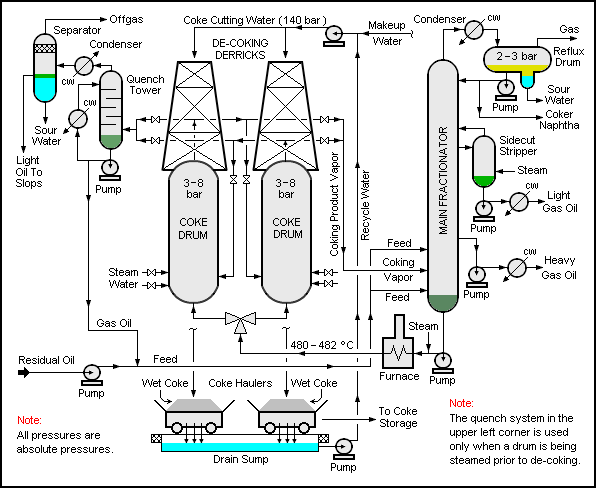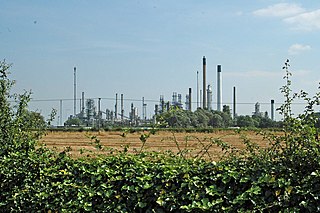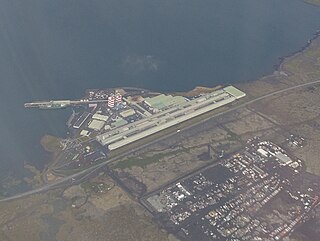Types
There are three types of cokers used in oil refineries: delayed coker, fluid coker and flexicoker. [2] [3] The one that is by far the most commonly used is the delayed coker.
The schematic flow diagram below depicts a typical delayed coker:

A coker or coker unit is an oil refinery processing unit that converts the residual oil from the vacuum distillation column into low molecular weight hydrocarbon gases, naphtha, light and heavy gas oils, and petroleum coke. The process thermally cracks the long chain hydrocarbon molecules in the residual oil feed into shorter chain molecules leaving behind the excess carbon in the form of petroleum coke.
This petroleum coke can either be fuel grade (high in sulphur and metals) or anode grade (low in sulphur and metals). The raw coke from the coker is often referred to as green coke. [1] In this context, "green" means unprocessed. The further processing of green coke by calcining in a rotary kiln removes residual volatile hydrocarbons from the coke. The calcined petroleum coke can be further processed in an anode baking oven in order to produce anode coke of the desired shape and physical properties. The anodes are mainly used in the aluminium and steel industry.
There are three types of cokers used in oil refineries: delayed coker, fluid coker and flexicoker. [2] [3] The one that is by far the most commonly used is the delayed coker.
The schematic flow diagram below depicts a typical delayed coker:


An oil refinery or petroleum refinery is an industrial process plant where petroleum is transformed and refined into products such as gasoline (petrol), diesel fuel, asphalt base, fuel oils, heating oil, kerosene, liquefied petroleum gas and petroleum naphtha. Petrochemical feedstock like ethylene and propylene can also be produced directly by cracking crude oil without the need of using refined products of crude oil such as naphtha. The crude oil feedstock has typically been processed by an oil production plant. There is usually an oil depot at or near an oil refinery for the storage of incoming crude oil feedstock as well as bulk liquid products. In 2020, the total capacity of global refineries for crude oil was about 101.2 million barrels per day.

In petrochemistry, petroleum geology and organic chemistry, cracking is the process whereby complex organic molecules such as kerogens or long-chain hydrocarbons are broken down into simpler molecules such as light hydrocarbons, by the breaking of carbon-carbon bonds in the precursors. The rate of cracking and the end products are strongly dependent on the temperature and presence of catalysts. Cracking is the breakdown of large hydrocarbons into smaller, more useful alkanes and alkenes. Simply put, hydrocarbon cracking is the process of breaking a long chain hydrocarbon into short ones. This process requires high temperatures.

Vacuum distillation or Distillation under reduced pressure is a type of distillation performed under reduced pressure, which allows the purification of compounds not readily distilled at ambient pressures or simply to save time or energy. This technique separates compounds based on differences in their boiling points. This technique is used when the boiling point of the desired compound is difficult to achieve or will cause the compound to decompose. Reduced pressures decrease the boiling point of compounds. The reduction in boiling point can be calculated using a temperature-pressure nomograph using the Clausius–Clapeyron relation.
A visbreaker is a processing unit in an oil refinery whose purpose is to reduce the quantity of residual oil produced in the distillation of crude oil and to increase the yield of more valuable middle distillates by the refinery. A visbreaker thermally cracks large hydrocarbon molecules in the oil by heating in a furnace to reduce its viscosity and to produce small quantities of light hydrocarbons.. The process name of "visbreaker" refers to the fact that the process reduces the viscosity of the residual oil. The process is non-catalytic.

Catalytic reforming is a chemical process used to convert petroleum refinery naphthas distilled from crude oil into high-octane liquid products called reformates, which are premium blending stocks for high-octane gasoline. The process converts low-octane linear hydrocarbons (paraffins) into branched alkanes (isoparaffins) and cyclic naphthenes, which are then partially dehydrogenated to produce high-octane aromatic hydrocarbons. The dehydrogenation also produces significant amounts of byproduct hydrogen gas, which is fed into other refinery processes such as hydrocracking. A side reaction is hydrogenolysis, which produces light hydrocarbons of lower value, such as methane, ethane, propane and butanes.

Petroleum coke, abbreviated coke, pet coke or petcoke, is a final carbon-rich solid material that derives from oil refining, and is one type of the group of fuels referred to as cokes. Petcoke is the coke that, in particular, derives from a final cracking process—a thermo-based chemical engineering process that splits long chain hydrocarbons of petroleum into shorter chains—that takes place in units termed coker units. Stated succinctly, coke is the "carbonization product of high-boiling hydrocarbon fractions obtained in petroleum processing ". Petcoke is also produced in the production of synthetic crude oil (syncrude) from bitumen extracted from Canada's tar sands and from Venezuela's Orinoco oil sands.

Fluid Catalytic Cracking (FCC) is the conversion process used in petroleum refineries to convert the high-boiling point, high-molecular weight hydrocarbon fractions of petroleum into gasoline, alkene gases, and other petroleum products. The cracking of petroleum hydrocarbons was originally done by thermal cracking, now virtually replaced by catalytic cracking, which yields greater volumes of high octane rating gasoline; and produces by-product gases, with more carbon-carbon double bonds, that are of greater economic value than the gases produced by thermal cracking.

Panipat Refinery is an oil refinery located in Baholi, Panipat, Haryana, India. It was set up in 1998. Panipat Refinery is the seventh refinery belonging to Indian Oil Corporation Limited. It is one of South Asia's largest integrated petrochemicals plants. Panipat Refinery meets the demand of petroleum products of Haryana and of the entire North-West Region including Punjab, J&K, Himachal, Chandigarh, Uttaranchal state and part of Rajasthan & Delhi. It stands by Indian Oil vision to become a major, diversified, transnational, integrated energy company, with national leadership and a strong environment conscience, playing national role in oil security and public distribution. Bedgsing younger of the Indian Oil refineries it houses latest refining technologies from Axens; France, Haldor-Topsoe; Denmark, UOP; USA, Stone & Webster; USA and Delta Hudson-Canada, Dupont, USA and ABB Luumas. The original cost of the refinery's construction was Rs 3868 Crores. It commenced with a capacity of 6 million tonnes per year and has been recently augmented to 12 million tonnes per year at a cost of Rs 4165 Crores. The refinery is designed to handle both indigenous and imported crudes. It receives crude through the Salaya Mathura Pipeline which also supplies crude to Mathura and Baroda refineries.

Kochi Refinery Limited (KRL) is a crude oil refinery in the city of Kochi in Kerala, India. It is the largest public sector refinery in India with a production capacity of 15.5 million tonnes per year. Formerly known as Cochin Refineries Limited and later renamed as Kochi Refineries Limited, it was acquired by Bharat Petroleum Corporation Limited in the year 2006. The refinery is situated at Ambalamugal, around 12 km (7.5 mi) east of the city centre.

The Humber Refinery is a British oil refinery in South Killingholme, North Lincolnshire. It is situated south of the railway line next to the A160; Total's Lindsey Oil Refinery is north of the railway line.

A delayed coker is a type of coker whose process consists of heating a residual oil feed to its thermal cracking temperature in a furnace with multiple parallel passes. This cracks the heavy, long chain hydrocarbon molecules of the residual oil into coker gas oil and petroleum coke.

Aluminium smelting is the process of extracting aluminium from its oxide, alumina, generally by the Hall-Héroult process. Alumina is extracted from the ore bauxite by means of the Bayer process at an alumina refinery.

The BPRefinery (Kent) was an oil refinery on the Isle of Grain in Kent. It was commissioned in 1953 and had a maximum processing capacity of 11 million tonnes of crude oil per year. It was decommissioned in August 1982.

Aluminium Bahrain B.S.C. (Alba) is the first aluminium smelter in the Middle East which started its commercial operations in 1971. The electricity that powers the process come from three power stations fueled by the nearby gasfields.

Petroleum refining processes are the chemical engineering processes and other facilities used in petroleum refineries to transform crude oil into useful products such as liquefied petroleum gas (LPG), gasoline or petrol, kerosene, jet fuel, diesel oil and fuel oils.
Petroleum naphtha is an intermediate hydrocarbon liquid stream derived from the refining of crude oil with CAS-no 64742-48-9. It is most usually desulfurized and then catalytically reformed, which rearranges or restructures the hydrocarbon molecules in the naphtha as well as breaking some of the molecules into smaller molecules to produce a high-octane component of gasoline.
Paradip Refinery is an oil refinery set up by Indian Oil Corporation in Paradip city in the state of Odisha. It was commissioned in 2016 with an installed capacity of 15 million tonnes per year. This refinery is spread over approximately 3,345 acres of land and is situated approximately 5 km southwest from the Paradip Port.
The petroleum industry in India dates back to 1889 when the first oil deposits in the country were discovered near the town of Digboi in the state of Assam. The natural gas industry in India began in the 1960s with the discovery of gas fields in Assam and Maharashtra. As on 31 March 2018, India had estimated crude oil reserves of 594.49 million metric tonnes (Mt) and natural gas reserves of 1339.57 billion cubic metres of natural gas (BCM).

The Ruwais Refinery is operated by the Abu Dhabi National Oil Company (ADNOC). The complex can process up to 837,000 barrels of crude oil and condensate per day, making it the fourth-largest single-site oil refinery in the world and the biggest in the Middle East. The refinery is situated in the city of Ruwais, in Abu Dhabi’s western region. It is highly integrated with ADNOC’s other plants in the Ruwais industrial area – such as the Borouge 3 petrochemical plant.
Barmer Refinery is an upcoming public sector refinery and petrochemical complex in the Pachpadra of Rajasthan, India. It is owned by HPCL Rajasthan Refinery Limited (HRRL), a joint venture between Hindustan Petroleum Corporation Limited and the Government of Rajasthan. This refinery will be connected with Jamnagar Refinery and Bathinda Refinery through Amritsar Jamnagar Expressway.